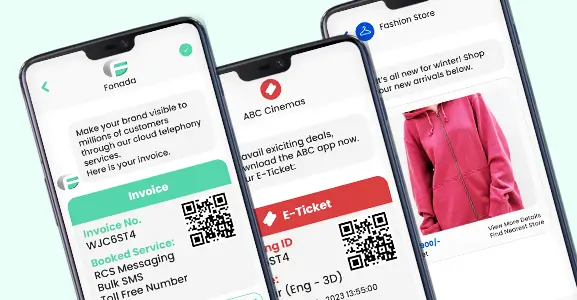Communication is a power that can turn back the clock; the only need is to understand how to use it. Businesses may communicate through email, social media, and texting. Every successful business relies on good communication.
It’s all about connecting clients from various continents across the globe, whether for work or in general; methods of communication differ. It includes voice calling, video calling, chat messaging, conferencing, and more. All of these can have an in-app voice API.
Let’s explore voice calling API in more detail and its importance for business growth.
What Is Voice Calling API ?
Voice APIs deliver mass calls to consumers using pre-recorded scripts. You can make calls simultaneously and can program them to respond differently based on the response. They may be set to detect voice answering machines and hang up or leave a voicemail. Similarly, you may program them to recognize when a real person responds, which can trigger a transfer to a live agent.
Voice call APIs are great for companies using bulk calls for marketing or communication. These Voice Calling APIs make the process more efficient, affordable, and effective. They’re the API of choice for companies who want to connect with customers through voice rather than email or text.
How Does A Voice Call API Work?
There are three easy steps to using a voice calling API: upload your consumer contacts, record your messages, and schedule your campaigns.
When going through this procedure, keep personalization in mind. It may imply separating client contact lists by region or other demographics.
Similarly, it’s ideal for tailoring your message to specific audiences. However, your core message should stay the same. Customization may enhance engagement and ROI.
When scheduling, consider what’s most convenient for each customer group. The more thought you put into your marketing, the better the results.
You may customize campaigns as you send them and receive statistics and reports. It helps you decide which campaigns to tweak or retire.
What’s A Good Voice API?
A good voice calling API is simple to use and has adequate documentation and SDKs. An API must be scalable and programmable for control and flexibility to customize applications to customer requirements.
What Are Voice API Customer Experience Benefits?
Voice APIs enable you to identify and service your consumers so you can solve their problems. Collecting contextual information lets your customer service representatives know who’s calling and why, whether they called through your website, app, or another channel.
Contextual communication empowers your team to personalize each customer conversation, saving orientation time and accelerating resolution. It enables real conversations that put customers at ease and boost satisfaction.
Voice APIs’ automated speech recognition features enable users’ simple self-service options, such as placing orders or verifying their identities using their voices. This functionality provides global consumers with fast, straightforward service.
Many clients value privacy. Therefore, you should ensure it. In-app voice links users from app to app and through the phone without disclosing phone numbers, improving privacy and avoiding off-platform transactions. Voice quality is crucial for all these experiences.
Voice APIs enable high-quality voice calling for your apps. Even the most creative and forward-thinking customer experience strategy will fail without excellent voice quality.
Why Enhancing Call Quality Is Beneficial To Business
Have you ever called customer service, informed a friendly agent what you needed, and disconnected? You’ve experienced bad call quality. Voice quality issues frustrate customers. They won’t find your customer support helpful or responsive if they can’t have a natural conversation with you.
They may wonder if your company values customer experience enough to invest in it. You may lose their business and referrals if your consumers have these perceptions after a call. Poor quality may sabotage the client experience.
How Does A Voice API Increase The Quality Of Calls?
APIs may help organizations improve landline, VoIP, and mobile call quality. Voice APIs can offer quality even during busy hours or as the company expands. These performance enhancements increase contact center quality, ensuring customers never encounter a patchy or unstable connection. When customers contact customer service, everyone can focus on the customers’ requirements.
Voice APIs provide minimal coding, so you may easily integrate them into your app, website, and other digital presences instead of building them from the start or waiting for expensive circuits. This adaptive technology can coexist with telephony systems as needed. Because you only pay for what you use, it’s a cost-effective way to enhance the customer calling experience.
A voice API enables innovation in ways traditional voice calling never could, such as by exchanging contextual information to personalize and improve the customer experience.
Features Of Voice Calling API:
-
Smart Interactive Voice Response System
Programmable voice APIs provide interactive menus. Voice APIs can do basic tasks like customer service without human intervention.
-
Answering Machine Detection
Developers may tailor user experience based on whether a person or robot answers a call. Machine responses help minimize unnecessary engagements.
-
Greeting Callers
We may use Voice APIs to build automated caller responses when the callee is unavailable.
-
Call Forking
Voice APIs may fork calls to many recipients. AI and sophisticated features enable fraud detection and voice biometrics.
-
Large-Scale Audio Conferencing
We may use Voice APIs to develop voice conferencing apps for people and teams worldwide. Voice APIs offer host options other than mute and unmute audio in calls.
-
Text-To-Speech
Voice APIs synthesize voice from text, which helps people with speaking disabilities.
Voice Calling API Use Cases
-
Customer Support
IVRS is popular as consumer self-help becomes the norm. Voice APIs offer IVRS, call recording (for quality audits), and logging. The contact center uses IVRS call routing and collects customer feedback.
-
Promotions
Digital space is full of advertisements. By urging customers to leave a missed call, companies may contact them later with product or service information. Following such a marketing approach may boost leads and conversions.
-
Travel Updates
Voice APIs may provide automatic travel updates to consumers. Multiple airlines use this technology to inform consumers about postponed flight departures.
-
Pre Recorded Messages/Audio
We can conduct outbound calls playing audio content for audio/voice-based service subscribers. Companies may use Voice APIs to explore IVR. Businesses use prerecorded voice messages to develop a dialogue with customers without manually attending to each.
-
Call Authentication
Two-factor authentication secures app and website transactions. With Voice Calling API, we can add a quick OTP authentication callback function for payment validations and user logins. Voice OTPs can be beneficial if SMS OTPs can’t reach customers due to bad connectivity.
-
Payment Reminder
Insurance and banking payment reminders demand personalization and politeness. Businesses must request on-time payments from consumers but must check their text. The wrong tone or strong language might annoy customers. Voice reminders are politer and more personal than text ones. You may set up outbound calls to remind consumers whose insurance premiums are due using a Voice API.
-
Lead Generation
Integrate your IVR and CRM to promote a missed call number; you can capture every call received on that number as a lead and nurture further.
How Can APIs Create A Better Customer Experience?
-
Flexible
Instead of using the default solution, customize APIs to meet your needs.
-
Multi-Purpose
Use it for “call us” widgets or mobile apps. Voice API manages incoming calls from anywhere around the globe.
-
Feature-Rich
Voice APIs provide multi-level IVR features, improving call experience and personalizing the solution. Call recordings, auto-attendant, and call analytics may improve call management.
-
Integration
Use voice APIs with the CRM and sync data to get the most out of both solutions.
-
Analytics And Insights
Voice APIs provide real-time customer information. Voice APIs improve data-driven decision-making and caller experience.
Why Is Voice Calling APIs A Smart Investment For You?
-
Personalized Calling
You may set meeting reminders and direct callers to the right agent using IVR, auto-attendant, and voice APIs. Voice APIs enable the creation of all calling features. They provide limitless customization to the solution.
-
Confidentiality And Safety
Voice APIs offer number masking to protect the privacy of callers. This number protects the original number from cyberbullying and illegal activity. It provides extra security and enhances callers’ trust in your services.
-
Easy To Port With Cloud Support
Portability saves us in case of disaster or data loss. The user-friendly web portal lets you view all your API-related actions and create and modify configurations. You can track their progress on the same portal.
Benefits Of Voice Call API For Business Applications
-
Ensures Customers’ Privacy
Ensuring customer data privacy is vital to every successful business. These APIs provide a consistent programmatic interface for accessing customers’ private accounts through transaction webhooks and REST API.
APIs help companies add secure omnichannel communication to their apps. Thus, it may enhance the needs of businesses, consumers, and end-users.
-
High-Productivity
Leveraging API and connecting in-app voice calls to the telephone with CRM, helpdesk, or application may improve communication and efficiency; APIs can boost customer satisfaction by increasing call quality. You can make a call with the click of a button without dialling manually.
-
Control Call Flows
With APIs, you may have control over calls, i.e., if a customer wants to speak with a specific department, they no longer have to call and set a callback but can have a call transferred to the department then and then with call forwarding. It reduces time and increases business.
-
Enhance Tracking
After API integration, you can record and monitor calls. You may automatically access and track the details for more visibility and insight.
-
Automated Customer Voice Response
When customers need clarification in a business, they like to interact swiftly with someone. Numerous businesses have adopted interactive voice responses to overcome this.
Interactive Voice Response (IVR) enables callers to access pre-recorded information without a live agent. We may also use this IVR system for surveys, promotions, polls, payments, and brand awareness.
Why Choose A Programmable Voice Call API For A Successful Business?
-
Global Audio Conferencing
Using APIs, one may integrate audio conferencing into applications, enabling them to communicate with highly configurable behavior to people and groups worldwide.
-
Browser Complexity
Web browsers, Android, and iOS implement voice calls differently. API quality may greatly impact platforms since low-level APIs make cross-platform work, but high-featured APIs automatically manage browser and platform differences.
-
Management Of Browser And Platform Updates
Every time a user uses the platform, the web browser and mobile devices are automatically updated, giving them access to new features.
-
UI And Layout Design
API provides a UI kit, and a full-featured API delivers a drop-in video widget with UI. With the most flexible full-featured API, you may customize the layout of the user interface using CSS and JavaScript.
-
Media Streaming
API media streaming is one of the most important features. Media forking is media streaming. It duplicates calls to send them to multiple users concurrently.
When a call connects, the API duplicates delivers, analyzes, and returns them in real-time. Even here, the second receiver won’t occupy the call stream. Thus no worries about dropped connections.
Which Industries Are Using Voice Calling APIs
-
Travelling And Tourism
Traveling is something we cannot avoid, and booking a last-minute ticket is a big deal. Travel and tourism businesses depend on Voice Call APIs and SDKs to satisfy customer needs.
-
Food Ordering And Delivery
Food delivery is the most important business that uses Voice Calling API to stay in contact with customers until delivery. It tracks ordered meals to maintain professionalism.
-
Online Shopping
Unlike the food industry, online shopping draws the individual. Here, API Voice Calling goes into action to supply the delivered item, including shipping and payment.
-
Financial Sector
API voice calling connects clients or customers from different locations in the finance sector. With this API, they may interact and share data using end-to-end encryption.
-
Healthcare
Healthcare involves phone calls, text messaging, group video chat, and one-on-one calling. Communication is important at every stage, whether it’s to make an appointment or check patient test results. APIs have improved industry communication.
Conclusion
Customers want conversations with your company, especially with voice technologies. Their expectations for an excellent customer experience are rising. Instead of a transactional interaction, people want a natural and comfortable dialogue. Clear communications make the difference in whether customers stay satisfied and receptive to doing business with you. A poor call or an impersonal exchange can hurt client sentiment. Voice APIs enable meaningful customer interactions in creative ways. Voice APIs are a crucial asset for enhancing customer experience.

Dec 11, 2024
Top Contact Center Optimization Tools For 2024
“A thriving business knows how to fetch maximum output from limited resources by optimizing ca... Read More
Nov 13, 2024
What Is Brand Communication? CPaaS Role Explained
Did you ever wonder why some advertisements grab your attention instantly, while others do not? The... Read More
Nov 01, 2024
What Is Automated Messaging And How Does It Work?
Automated messaging or text automation empowers businesses and marketing professionals to connect wi... Read MoreLatest Updates
From Fonada
Industry Insights, Trends, Innovations, Updates, and Case Studies from Industry Experts
View
Customer
Reviews
Discover why our customers love us - read their authentic and heartfelt reviews!
View
Case
Studies
Explore real-life scenarios, offering analysis, and solutions to practical challenges
View
Convert Leads Into Sales With Fonada
Trusted CPaaS Solution Provider








